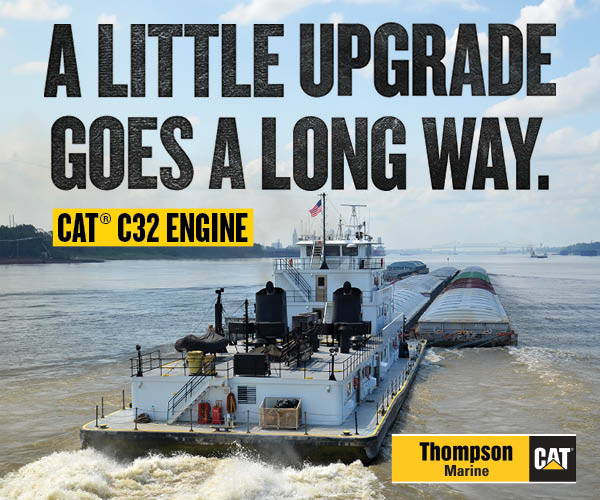Birdon Expected To Begin WCC Construction Next Year
In October 2022, the U.S. Coast Guard awarded a $1.19 billion contract to Denver-based Birdon America to build its Waterways Commerce Cutter (WCC) program. The order called on Birdon to build 16 river buoy tenders and 11 inland construction tenders. According to an October analysis by the Congressional Research Service (CRS), the Coast Guard wanted the first new WCCs to be in service by 2025. A contract of $1.19 billion means each new vessel will cost about $44 million.
Now, 26 months after the contract award, the program remains under development, and the Coast Guard now expects construction—not service—to start in 2025.
So far, the Coast Guard has awarded about $46 million to Birdon for pre-construction work. In addition, the Maritime Administration (MarAd) awarded Birdon a 2024 Small Shipyard Grant of just under $1 million for a new automated welding system at Birdon’s recently purchased shipyard in Bayou La Batre, Ala. Birdon announced the acquisition of the shipyard from Metal Shark on January 31.
MarAd’s grant will cover 75 percent of the cost of the welding system. In an October press release, Birdon referred to the automated welding system as a ‘’revolutionary shipbuilding technology’’ providing precision welding of large panels, a process Birdon described as typically difficult or impossible because of access.
The press release, titled “Birdon’s Approach Designed to Provide Consistent, Cost-Effective, High-Quality Results,” highlights the company’s steps taken to move toward WCC construction. While Birdon initially planned to use various partners and subcontractors for the WCC design and construction, the company now plans to have its own team do all design work, with construction moved in-house as well.
Birdon made the change “to keep the program on schedule and reduce technical risk.” In the press release, Birdon stated, “This in-house approach has proven successful, and the company has also applied it to WCC production.”
In its October update, Birdon CEO Jamie Bruce said the company will be opening new ‘’purpose-built, on-site facilities in the coming months,’’ with additional capital improvements underway. According to Birdon, the shipyard, when up and running, will have the capacity to build up to four vessels simultaneously and dock up to six vessels.
In August, Birdon received Coast Guard certification that its facility in Alabama meets requirements for docking, repairing and relaunching any Coast Guard vessel up to 589 long tons.
“This certification,” the company stated, “indicates that Birdon’s Alabama shipyard has the equipment, processes and technical capabilities necessary to lift and launch the new WCC vessels.”
Birdon’s previous certification only permitted lifting Coast Guard vessels under 65 feet in length.
The move away from outside subcontractors is the latest development in a program that has stirred controversy from the beginning. Soon after the Coast Guard awarded the contract to Birdon, Bayou La Batre-based Steiner Construction and Coden, Ala.-based Master Boat Builders (MBB) formally protested the contract award, arguing that the process failed to meet Small Business Administration (SBA) guidelines. Both Steiner Construction and MBB also bid on the WCC contract, with Steiner’s bid for the program coming in under $898 million and MBB’s around $932.4 million, as previously reported in The Waterways Journal.
The SBA later determined that Birdon America indeed had been ineligible to bid on the WCC contract. The Government Accountability Office (GAO), however, dismissed Steiner’s protest almost a year ago after determining that the Coast Guard originally awarded the contract in accordance with the SBA’s initial determination.
Subsequently, Birdon announced MBB, working as a subcontractor, would build the superstructures for the waterways commerce cutters. That, however, is no longer the case.
“We will not be building the superstructure for the WCC program,” MBB President Garrett Rice said in a statement to The Waterways Journal. “As the circumstances around the program changed over the last year, the risk just became too high. Our commercial business has always been our top priority, and we are excited about our significant growth in this market in the years to come.”
In an emailed statement, the Coast Guard said, “The program remains on schedule, and there are no schedule concerns at this time.” The Coast Guard added that the program has completed pre-construction milestones, including a preliminary design review, purchase of long lead-time materials, an early operational assessment and logistics assessments ahead of the planned start of construction in 2025.
The Congressional Research Service’s October summary report stated that the House Appropriations Committee voted during fiscal year 2025 budget hearings to add $40 million to the WCC program. The committee noted the urgency to fund WCC replacements. Officially, the Coast Guard requested $135 million for FY2025, and the committee bumped that sum up to $175 million.
Just this month, Schottel announced that Birdon plans to outfit the forthcoming WCCs with the company’s Schottel RudderPropellers (SRPs).
Birdon America did not reply to phone calls and emails requesting comment regarding the status of the WCC program.



